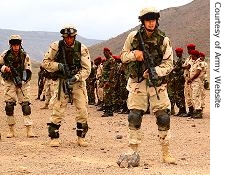2006年VOA标准英语-US Gives Radar System to Sao Tome and Principe(在线收听)
By Al Pessin
Pentagon
05 October 2006
The U.S. military is giving the West African island nation of Sao Tome and Principe an $18 million system to help it keep track of activity in its territorial waters and nearby ocean areas. The military hopes the move will inspire other countries in the area to accept or develop similar capabilities in order to improve regional security.
----
The navy calls it a "Maritime Domain Awareness System." It is a network of radar dishes, radio antennas and infra-red, high-powered binoculars, designed to detect unauthorized use of the sea.
 US soldiers during training on a range in rural Djibouti as Djiboutian Army troops observe (file photo Jan. 22, 2004) |
||
The science advisor to the U.S. Navy's European Command, John Middleman, says the sea is the world's largest "ungoverned space," and the United States wants the coastal states of Africa to expand their ability to govern their part of that space.
"By creating capabilities in many countries to gather information, that gives them better awareness of their maritime domain, and then to share that, we hope to improve the overall maritime safety, security, economic well-being, [and] environmental protection of the area," he said.
Middleman says the new system for Sao Tome and Principe will take two years to build, and American trainers will stay in the islands for an additional year to make sure local troops or civilians are fully qualified to operate it. He says most of the builders and trainers will be civilians, and when the project is finished, it will be entirely handed over to the local government.
The system includes a maritime radar component that can provide information about vessels within about 25 kilometers and large antennas that can detect signals broadcast by large ships as far as 150 kilometers away.
High-powered binoculars and infra-red sensors provide more information about what is in nearby areas of the sea. The goal is to detect boats involved in illegal activities, such as terrorism, smuggling people or goods, illegal fishing and the dumping of garbage and other pollutants.
Science adviser Middleman notes that, because most of the countries of West Africa have only short coastlines, a boat involved in such activities can cross the territorial waters of several countries in a short period of time.
He says that is why the United States would like to provide similar systems to other countries in the region, or for those countries to develop their own maritime awareness capabilities.
He says U.S. officials also hope the countries will share their data, to provide all of them with a regional view, but he says data sharing is not required, not even with the United States.
"We hope to demonstrate the power of regional information sharing, but there's no burden for any country to share information they don't want to," he said.
The agreement to provide the Maritime Awareness System to Sao Tome and Principe comes as the U.S. military is considering establishing a separate command to handle its operations in Africa, which are now divided among three regional commands.
Senior officials are putting the final touches on a plan that is to be presented to Defense Secretary Donald Rumsfeld by the end of this month.
After meetings in Washington in September, Sao Tome and Principe's President Fradique de Menezes was quoted by the Sapa news agency as saying the United States may put the future possible Africa Command in his country.
But Pentagon officials cannot confirm that, and say it is far too early to speculate on the location of a command that has not even been formally proposed yet. They also note that all but one of the existing regional commands are based in the United States.